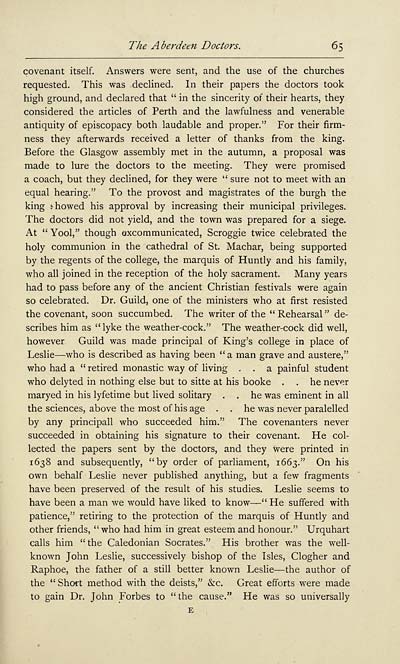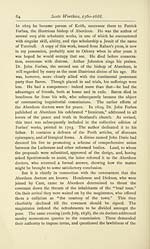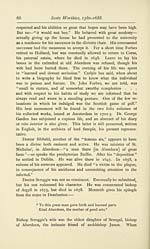Scots worthies, 1560-1688
(85) Page 65
Download files
Complete book:
Individual page:
Thumbnail gallery: Grid view | List view

The Aberdeen Doctors. 6$
covenant itself. Answers were sent, and the use of the churches
requested. This was declined. In their papers the doctors took
high ground, and declared that " in the sincerity of their hearts, they
considered the articles of Perth and the lawfulness and venerable
antiquity of episcopacy both laudable and proper." For their firm-
ness they afterwards received a letter of thanks from the king.
Before the Glasgow assembly met in the autumn, a proposal was
made to lure the doctors to the meeting. They were promised
a coach, but they declined, for they were " sure not to meet with an
equal hearing." To the provost and magistrates of the burgh the
king i-howed his approval by increasing their municipal privileges.
The doctors did not yield, and the town was prepared for a siege.
At " Yool," though excommunicated, Scroggie twice celebrated the
holy communion in the cathedral of St. Machar, being supported
by the regents of the college, the marquis of Huntly and his family,
who all joined in the reception of the holy sacrament. Many years
had to pass before any of the ancient Christian festivals were again
so celebrated. Dr. Guild, one of the ministers who at first resisted
the covenant, soon succumbed. The writer of the " Rehearsal " de-
scribes him as "lyke the weather-cock." The weather-cock did well,
however Guild was made principal of King's college in place of
Leslie — who is described as having been "a man grave and austere,"
who had a " retired monastic way of living . . a painful student
who delyted in nothing else but to sitte at his booke . . he never
maryed in his lyfetime but lived solitary . . he was eminent in all
the sciences, above the most of his age . . he was never paralelled
by any principall who succeeded him." The covenanters never
succeeded in obtaining his signature to their covenant. He col-
lected the papers sent by the doctors, and they were printed in
1638 and subsequently, "by order of parliament, 1663." On his
own behalf Leslie never published anything, but a few fragments
have been preserved of the result of his studies. Leslie seems to
have been a man we would have liked to know — " He suffered with
patience," retiring to the protection of the marquis of Huntly and
other friends, "who had him in great esteem and honour." Urquhart
calls him "the Caledonian Socrates." His brother was the well-
known John Leslie, successively bishop of the Isles, Clogher and
Raphoe, the father of a still better known Leslie- — the author of
the " Short method with the deists," &c. Great efforts were made
to gain Dr. John Forbes to "the cause." He was so universally
E
covenant itself. Answers were sent, and the use of the churches
requested. This was declined. In their papers the doctors took
high ground, and declared that " in the sincerity of their hearts, they
considered the articles of Perth and the lawfulness and venerable
antiquity of episcopacy both laudable and proper." For their firm-
ness they afterwards received a letter of thanks from the king.
Before the Glasgow assembly met in the autumn, a proposal was
made to lure the doctors to the meeting. They were promised
a coach, but they declined, for they were " sure not to meet with an
equal hearing." To the provost and magistrates of the burgh the
king i-howed his approval by increasing their municipal privileges.
The doctors did not yield, and the town was prepared for a siege.
At " Yool," though excommunicated, Scroggie twice celebrated the
holy communion in the cathedral of St. Machar, being supported
by the regents of the college, the marquis of Huntly and his family,
who all joined in the reception of the holy sacrament. Many years
had to pass before any of the ancient Christian festivals were again
so celebrated. Dr. Guild, one of the ministers who at first resisted
the covenant, soon succumbed. The writer of the " Rehearsal " de-
scribes him as "lyke the weather-cock." The weather-cock did well,
however Guild was made principal of King's college in place of
Leslie — who is described as having been "a man grave and austere,"
who had a " retired monastic way of living . . a painful student
who delyted in nothing else but to sitte at his booke . . he never
maryed in his lyfetime but lived solitary . . he was eminent in all
the sciences, above the most of his age . . he was never paralelled
by any principall who succeeded him." The covenanters never
succeeded in obtaining his signature to their covenant. He col-
lected the papers sent by the doctors, and they were printed in
1638 and subsequently, "by order of parliament, 1663." On his
own behalf Leslie never published anything, but a few fragments
have been preserved of the result of his studies. Leslie seems to
have been a man we would have liked to know — " He suffered with
patience," retiring to the protection of the marquis of Huntly and
other friends, "who had him in great esteem and honour." Urquhart
calls him "the Caledonian Socrates." His brother was the well-
known John Leslie, successively bishop of the Isles, Clogher and
Raphoe, the father of a still better known Leslie- — the author of
the " Short method with the deists," &c. Great efforts were made
to gain Dr. John Forbes to "the cause." He was so universally
E
Set display mode to:
![]() Universal Viewer |
Universal Viewer | ![]() Mirador |
Large image | Transcription
Mirador |
Large image | Transcription
Images and transcriptions on this page, including medium image downloads, may be used under the Creative Commons Attribution 4.0 International Licence unless otherwise stated. ![]()
| Histories of Scottish families > Scots worthies, 1560-1688 > (85) Page 65 |
|---|
| Permanent URL | https://digital.nls.uk/95152046 |
|---|
| Description | A selection of almost 400 printed items relating to the history of Scottish families, mostly dating from the 19th and early 20th centuries. Includes memoirs, genealogies and clan histories, with a few produced by emigrant families. The earliest family history goes back to AD 916. |
|---|

